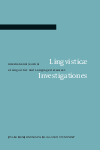
Linguisticae Investigationes
metrics 2024
Advancing the frontiers of linguistic research.
Introduction
Linguisticae Investigationes is a prestigious academic journal published by John Benjamins Publishing Co, dedicated to advancing the field of linguistics and language studies. Established in 1977 and reflecting a rich history of scholarly contributions, this journal has persisted through significant disciplinary developments and continues to publish original research, articles, and reviews that explore the intricate facets of language. With an ISSN of 0378-4169 and an E-ISSN of 1569-9927, the journal is indexed in Scopus, currently ranking in the 31st percentile within the linguistics and language category, demonstrating its solid impact in the field despite its Q3 quartile classification. The peer-reviewed articles aim to foster collaboration and innovation among linguists, providing a platform for researchers, professionals, and students to explore emerging theories and methodologies. Although currently not an Open Access journal, it remains an essential resource for anyone passionate about the nuances of language and its study, reinforcing its role as a cornerstone for dialogue in contemporary linguistics.
Metrics 2024
 0.13
0.13 0.30
0.30 0.30
0.30 15
15Metrics History
Rank 2024
Scopus
JCI (Web Of Science)
Quartile History
Similar Journals

Language and Linguistics
Pioneering Research in Language and LinguisticsLanguage and Linguistics is a leading academic journal published by ACAD SINICA, INST LINGUISTICS, based in Taiwan. Established in 2008, this journal has rapidly gained recognition within the field of linguistics, achieving a commendable ranking of Q2 in the 2023 category quartiles and holding positions in the top percentiles of Scopus rankings for both Arts and Humanities and Social Sciences. With an ISSN of 1606-822X and an E-ISSN of 2309-5067, the journal aims to foster the development of linguistics research by providing a platform for the dissemination of innovative and interdisciplinary studies. While it currently operates on a traditional subscription model, its significant contribution to the advancement of linguistic theory and its applications makes it an invaluable resource for researchers, professionals, and students alike. Spanning converged years from 2008 to 2024, Language and Linguistics continues to shape the dialogue in understanding language phenomena and encourages submissions that push the boundaries of current linguistic knowledge.
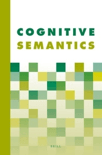
Cognitive Semantics
Decoding Language Through Cognitive LensesCognitive Semantics, published by BRILL, is a leading academic journal dedicated to the intricate study of cognitive processes underlying language use and semantic meaning. With its ISSN 2352-6408 and E-ISSN 2352-6416, this journal contributes significantly to the fields of linguistics and language studies, reflecting its importance in contemporary research on cognitive linguistics. Over its publication span from 2015 to 2024, it has established a niche as a Q3 ranked journal in the Linguistics and Language category for 2023, showcasing its relevance and growing influence in the academic community. Although currently not open access, the journal aims to provide a robust platform for exchanging ideas, theories, and methodologies related to cognitive semantics, fostering interdisciplinary dialogue among researchers, professionals, and students. Readers can expect to uncover valuable insights into the cognitive mechanisms that shape our understanding of language, making this journal an essential resource for anyone involved in linguistic research.
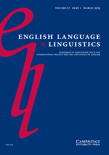
English Language & Linguistics
Exploring the Depths of Language and LinguisticsEnglish Language & Linguistics is a prestigious journal published by Cambridge University Press, specializing in the dynamic fields of linguistics and language studies. With an impressive Q1 ranking in both Linguistics and Language categories for 2023 and a notable placement in the Scopus metrics, where it ranks #142 out of 1088 in Arts and Humanities, the journal is recognized for its high-quality research contributions and robust impact in the scholarly community. Since its inception in 1997, English Language & Linguistics has provided a forum for researchers to explore various aspects of language, facilitating the dissemination of innovative ideas and empirical studies. With no open access options currently available, the journal remains a valuable resource within the United Kingdom and beyond, fostering a deeper understanding of language intricacies and their broader societal implications. For practitioners and academicians alike, this journal is a critical resource for keeping abreast of the latest advancements in linguistics.

Functions of Language
Illuminating the Dynamics of Language FunctionsFunctions of Language, published by John Benjamins Publishing Co, serves as a vital platform for scholars and practitioners in the fields of linguistics and language studies. With its ISSN 0929-998X and E-ISSN 1569-9765, this esteemed journal, based in the Netherlands, has solidified its reputation through a focused dedication to exploring the multifaceted roles that language plays across various contexts. Ranked in the top percentile of leading journals in Linguistics and Language (Q2 category, 2023) and holding impressive Scopus ranks within both the Arts and Humanities and Social Sciences sectors, the journal emphasizes research that interlinks theoretical insights with practical implications. Functions of Language aims to advance our understanding of linguistic structures and their applications, making it an essential resource for researchers, professionals, and students alike who are eager to contribute to the evolving discourse in language studies. With content converging from 1994 to 2024, the journal reflects ongoing scholarly engagement and innovation in the field.

Vestnik Sankt-Peterburgskogo Universiteta-Yazyk i Literatura
Advancing Scholarly Dialogue in Linguistics and Literary TheoryVestnik Sankt-Peterburgskogo Universiteta-Yazyk i Literatura, published by ST PETERSBURG UNIV PRESS, stands as a pivotal academic journal in the fields of linguistics and literature, reflecting a profound commitment to the exploration of language and literary theory. With an ISSN of 2541-9358, this journal has steadily built its reputation since its inception in 2017, achieving impressive rankings in Scopus that place it within the top tiers of its categories—Q2 in Linguistics and Language and Q1 in Literature and Literary Theory as of 2023. The journal serves as an essential platform for researchers, professionals, and students who are keen to delve into the complex interactions between language and literature. Although currently not offering Open Access, its contributions are invaluable to advancing scholarly dialogue and fostering understanding within these vibrant fields. With a converged publication timeline extending through 2024, Vestnik Sankt-Peterburgskogo Universiteta-Yazyk i Literatura exemplifies the ongoing commitment to high-quality research and critical thought, making it an indispensable resource for those dedicated to the study of language and its literary manifestations.

REVUE DE LINGUISTIQUE ROMANE
Deepening Understanding of Linguistic StructuresREVUE DE LINGUISTIQUE ROMANE, published by the esteemed SOCIÉTÉ LINGUISTIQUE ROMANE, is a prominent academic journal dedicated to the exploration of Romance linguistics. With its ISSN 0035-1458, the journal plays a significant role in advancing knowledge within the fields of linguistics and the history and philosophy of science. Although it does not currently offer Open Access, it provides critical insights and peer-reviewed research that are indispensable for scholars, educators, and students interested in the nuances of Romance languages. The journal, which has seen converged coverage from 2006 to 2017, and then again from 2019 to 2021, is ranked in the third quartile (Q3) across various categories within Scopus, reflecting its established presence in the academic community. As a vital resource for interdisciplinary studies, REVUE DE LINGUISTIQUE ROMANE is instrumental for those seeking to deepen their understanding of linguistic structures, cultural nuances, and the historical development of Romance languages.

Contrastive Pragmatics
Innovative research for a deeper understanding of pragmatics.Contrastive Pragmatics, published by BRILL, is a premier open-access journal dedicated to advancing the field of linguistics through a unique focus on the pragmatic aspects of language comparison and contrast. Since its inception in 2020, this journal has rapidly established itself as a vital resource for scholars interested in the intricate interplay between language use, culture, and communication, reflecting the increasing importance of pragmatics in understanding cross-linguistic phenomena. With its Q2 ranking in Linguistics and Language as of 2023, and its commendable positions within Scopus ranks, Contrastive Pragmatics offers a platform for innovative research that not only highlights theoretical developments but also invites empirical investigations across languages and cultures. The journal's commitment to open access ensures that cutting-edge research is freely available, fostering collaboration and knowledge sharing among researchers, professionals, and students alike. For those looking to stay at the forefront of linguistic research, Contrastive Pragmatics is an essential avenue for exploration.
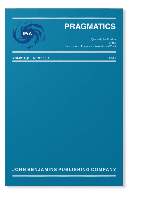
Pragmatics
Illuminating the dynamics of communication across contexts.Pragmatics is a premier international journal dedicated to the exploration and development of the field of pragmatics, published by John Benjamins Publishing Co. This esteemed journal, with an ISSN of 1018-2101 and E-ISSN 2406-4238, offers a vital platform for interdisciplinary research in linguistics, philosophy, and social sciences, making significant contributions to scholarly discourse since its convergence in 2005. Recognized for its high-impact research, Pragmatics boasts a prestigious Q1 ranking in both Linguistics and Language and Philosophy as of 2023, with impressive Scopus rankings that place it in the top percentiles of its categories. The journal aims to enhance understanding of communication in diverse contexts and encourages submissions that reflect innovative theoretical perspectives and empirical findings. Although not an open-access journal, it is essential for researchers, professionals, and students seeking to stay at the forefront of pragmatic studies and related disciplines. With its base in Belgium and an address in Amsterdam, Pragmatics continues to influence global conversations in the humanities and social sciences.

Revista Virtual de Estudos da Linguagem-ReVEL
Exploring the Dynamics of Language ResearchRevista Virtual de Estudos da Linguagem-ReVEL is a prominent academic journal dedicated to the field of linguistics, published by REVISTA VIRTUAL ESTUDOS LINGUAGEM in Brazil. With its ISSN 1678-8931, ReVEL aims to provide a platform for scholarly communication and dissemination of research across diverse areas of language studies, including sociolinguistics, language acquisition, and discourse analysis. As an open-access journal, it fosters accessibility to important linguistic research, allowing researchers, educators, and students alike to engage with the latest findings without subscription barriers. The journal’s focus on innovative methodologies and interdisciplinary approaches makes it a valuable resource for those seeking to deepen their understanding of language dynamics in various contexts. By contributing to the growing body of knowledge in this field, ReVEL plays a crucial role in promoting scholarly dialogue and enhancing the visibility of Brazilian linguistic research on a global scale.
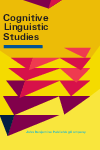
Cognitive Linguistic Studies
Advancing Insights in Cognitive LinguisticsCognitive Linguistic Studies is a prestigious journal published by JOHN BENJAMINS PUBLISHING CO, dedicated to advancing the interdisciplinary field of cognitive linguistics. With an ISSN of 2213-8722 and an E-ISSN of 2213-8730, the journal serves as an essential platform for the dissemination of high-quality research that delves into the intricate relationships between language, thought, and cultural contexts. Located in the vibrant academic milieu of the Netherlands, this journal has gained recognition for its impactful contributions, reflected in its respectable Q2 category ranking within the field of Linguistics and Language as of 2023. Redesigned to accommodate a broader audience, the journal welcomes original research articles, reviews, and theoretical discussions that bridge cognitive science and linguistic inquiry. As the journal continues its trajectory of growth, being indexed with a solid Scopus rank of #459 out of 1167 in the social sciences, it remains a vital resource for researchers, professionals, and students eager to explore the dynamic interplay between cognition and language.